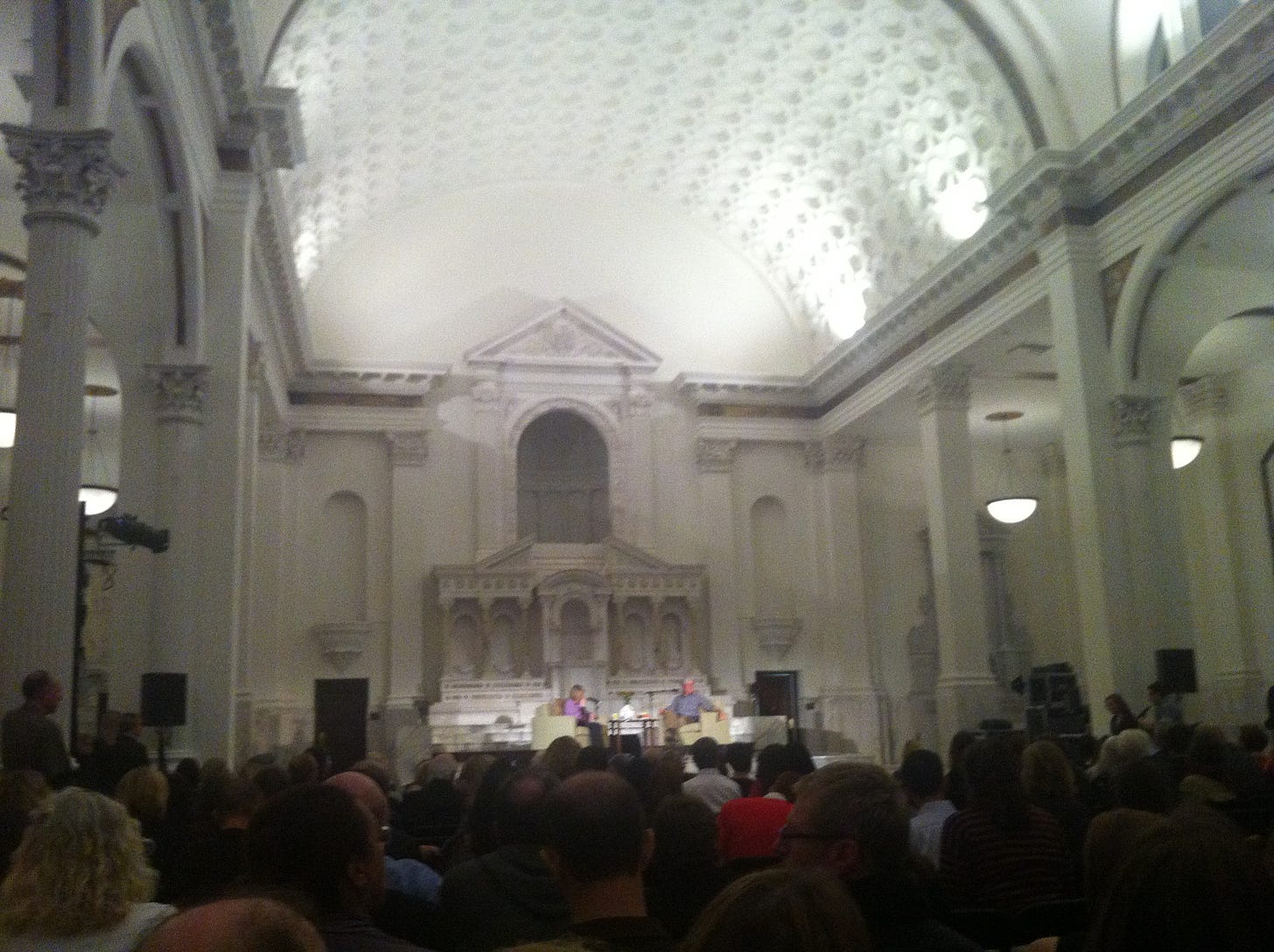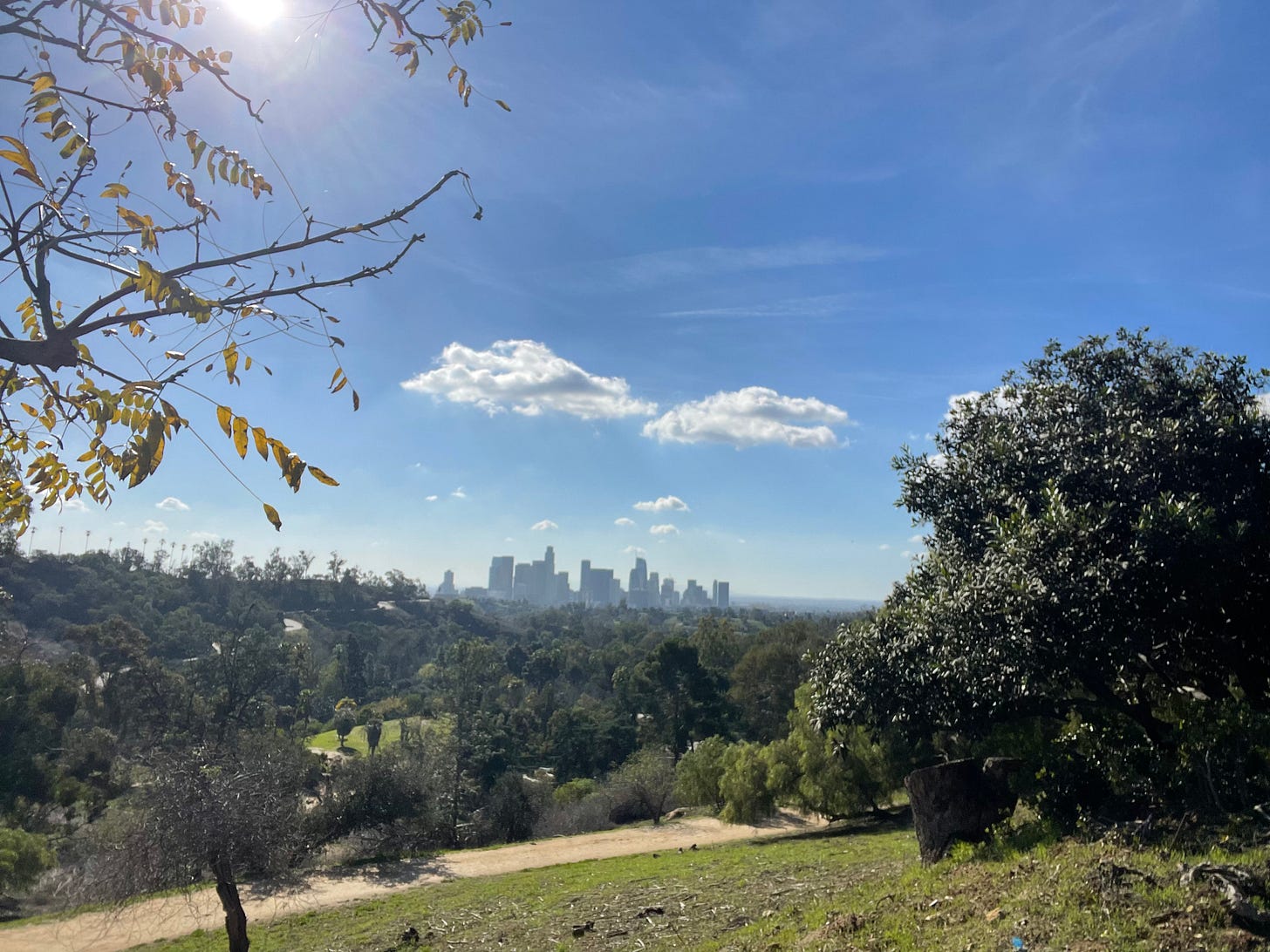Tiny Revolutions №84: Dig Deep
+ you can't pin joy like a moth 🦋
You may have heard the writer Joan Didion died last month. I saw her read in Downtown LA in 2011, when she was on tour for her memoir Blue Nights. At 76, she was already incredibly frail by then, just a wisp in an armchair talking to a cavernous room, but her words were powerful and clear as ever.
I came to Didion in my early 30’s, not long after my nervous breakdown. I was in the process of rebuilding my life and her essays spoke to me like nothing else had in a long time; I read them over and over. What I loved then and still love now is that whether she was writing about her own life or reporting on others, she never pulled a single punch. It always seemed to me a display of astonishing power, that willingness to spill things out on the page with a shocking level of honesty. To say the things we were all reckoning with but didn’t dare speak aloud. The only other place I’d come across it in topics that resonated with me personally was in the work of Dorothy Allison, whose book Bastard Out of Carolina completely blew my mind.
Didion’s work, however, was all about how to live — what does it mean to be a person, how do you go about the business of living a life, how do you live in a world full of unfathomable cruelty and a complete inability to control whether any of it comes for you.
For Didion it all came back to a relentless examination of the self. Here’s an excerpt from “On Self-Respect,” which appeared in Vogue in 1961:
“Although to be driven back upon oneself is an uneasy affair at best, rather like trying to cross a border with borrowed credentials, it seems to me now the one condition necessary to the beginnings of real self-respect. Most of our platitudes notwithstanding, self-deception remains the most difficult deception. The charms that work on others count for nothing in that devastatingly well-lit back alley where one keeps assignations with oneself: no winning smiles will do here, no prettily drawn lists of good intentions.”
The message she was sending was one I was coming face to face with every day: that you can hide who you are from everyone but the most important person of all: yourself. The reality I was confronting at the time was that I didn’t like myself, didn’t like what I was doing with my life or where it was heading, and that I could not go on until I found a way to do so. What Didion’s writing did for me was confirm that *I wasn’t wrong to feel that way.*
Which, frankly, was refreshing. One of life’s great hardships is that when you’re going through it — I mean really going through it — you are the only one who truly knows. Your partner, friends, family, therapist, etc. can all serve as a sounding board, but they can’t see how bad the problem really is or what it’s doing to you, and most of the time they’ll tell you you’re fine, you’re wonderful, everything’s gonna be great, blah blah blah. And not only that, they often don’t want to see how bad the problem really is because that might require changes, and you changing could present a problem for them.
It’s unfair. It’s hard! And it’s life. And I knew it and so did Joan Fucking Didion, goddess rest her soul. The point she makes in the essay is that you can spend your life running from what you know in your heart of hearts to be the truth, but it comes with a high cost:
“It is the phenomenon sometimes called alienation from self. In its advanced stages, we no longer answer the telephone, because someone might want something; that we could say no without drowning in self-reproach is an idea alien to this game. Every encounter demands too much, tears the nerves, drains the will, and the specter of something as small as an unanswered letter arouses such disproportionate guilt that one's sanity becomes an object of speculation among one's acquaintances. To assign unanswered letters their proper weight, to free us from the expectations of others, to give us back to ourselves—there lies the great, the singular power of self-respect. Without it, one eventually discovers the final turn of the screw: one runs away to find oneself, and finds no one at home.”
Didion knew what I wanted was self-respect and that you had to work to get it, but it was quite possibly the most important work a person can do. An idea that later bore out when I discovered the teachings of Zen, but that’s a story for another time.
All of this feels especially relevant now as we’ve rounded the corner into another year. I love to think about resolutions (or intentions, as we’re now calling them I guess 🙄), because I always want to get better at the game of life. But they’re kinda bullshit, no? I’m of the age where I’ve been trying really hard for a really long time with mixed results and can barely muster the enthusiasm to say I’m gonna make BIG SPARKLY CHANGES. But I can recognize that sometimes that’s exactly what you have to do.
So I offer this up to you in case it is helpful: don’t worry about all the bullshit goals, the ones like, “I want to lose 20 pounds” or “I’m going to run a marathon” or “I’d like to plan a trip to Bora Bora.” I’m not saying you shouldn’t do those things; of course you should if that’s what you want to do.
But I am here to say that doing those things will be 1000 times easier if you dig deeper and and make the changes you know deep, deep, deep down that you need to make.
And again, only you can know what those are. Whether we are up to the task or not, that’s the deal we’ve been handed here in this mortal coil. We get one life and it’s up to us to go about it in a way that is acceptable to us — and maybe even meaningful, if we’re lucky. So dig deep, friends. I’ll be digging right alongside you.
On to a few other things I thought were worth sharing:
Give Your Mind a Shower
“The point of meditation is to get to know yourself. To learn to listen to yourself despite all the other competing information and stimuli that comes from the outside. You can think of it as a sort of mental hygiene — over time, you start to see yourself more clearly, and to be better in touch with your wants and needs.”
I wrote a little something for The Friday Digest newsletter about how to start — and stick with — a meditation habit. If you’re thinking about it, maybe it’ll be helpful. Five Things to Know About Meditation.
Some Stuff I Liked on Twitter
Happy New Year!
2021 was (obviously) very shitty on a macro level, but great for me personally. I lived, laughed, and loved to a pretty high degree, and I’m proud and pleased to be able to say so in a public forum. This is not always the case. Thanks for being here and for reading, as always. This project keeps me going in ways that are hard to explain.
What should we get up to in 2022?
😘
Sara








Always so happy when you appear in my inbox! I will confess that I've never read Didion, and it sure seems like I should. But like many authors with an expansive back catalogue, I often never get to it because I don't know where to start. Where would you start knowing what you know of her work now?
Loved that tweet about the moth. Has been my guiding principle so far in 2022.